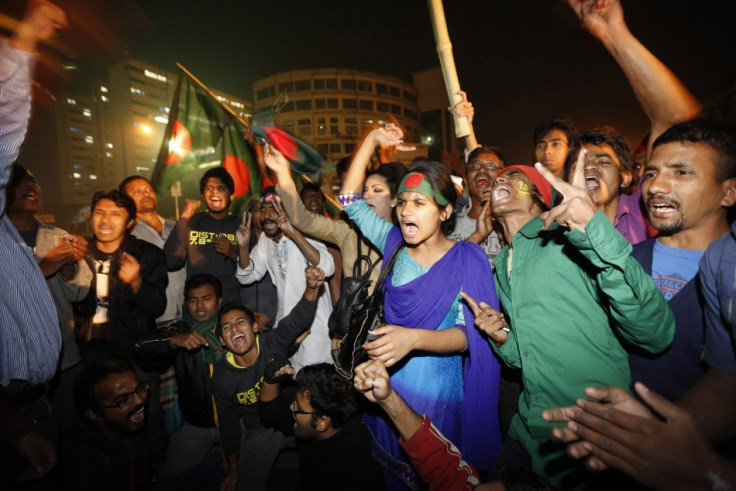Abdul Kader Mullah: Hanged Islamist Buried as Violence Kills 4 in Bangladesh

Executed Bangladeshi Islamist Abdul Kader Mullah was buried in a pre-dawn ceremony at his ancestral village, while at least four people have been killed in clashes between his Jamaat-e-Islami party workers and security forces.
The burial of Mullah, the assistant secretary general of the Jamaat-e-Islami party, was held before dawn in his ancestral village of Sadarpur and was attended by a few hundred party workers and family members.
Mullah, convicted of crimes against humanity during the country's 1971 war of independence, had lost his final appeal against death penalty and his hanging was expected to take place any time after sunset.
He was hanged a little after 10pm local time. "He [Mollah] was hanged at 10:01pm. His body was kept dangling for 20 minutes to confirm his death," The Daily Star quoted Dhaka District Magistrate Sheikh Yusuf Harun as saying.
An ambulance carrying the body of the man who had been accused of orchestrating the killing of hundreds of people 42 years ago arrived at his nondescript village in Faridpur at 3:15am.
Mainuddin Mollah, Mullah's younger brother, received the body in the presence of state officials. He was buried shortly after, following Islamic burial rituals.
Even as the Bangladesh Supreme Court threw out a last-minute petition asking for a review of Mullah's death penalty, clearing the way for his immediate execution, the Jamaat-e-Islami and the 18-party opposition had called for nationwide protests.
Banks Ransacked
The protesters clashed with law enforcement personnel across the country and attacked commercial centres, ransacked banks, vandalised vehicles and exploded crude bombs, the report said.
Jamaat workers also torched and vandalised the home of a prominent lawmaker from Prime Minister Sheikh Hasina's Awami League party.
The trial that led to the eventual execution of Mullah, who is also known as the "butcher of Mirpur" owing to the atrocities committed during the turbulent independence struggle, had been initiated by the government of Sheikh Hasina in 2010.
Mullah's conviction for war crimes and initial sentence of life imprisonment in February had triggered violent street clashes in Bangladesh that killed about 100 people as protesters demanded the death penalty for the Islamist leader.
Hasina, whose father Sheikh Mujibur Rahman was assassinated shortly after he led the country to independence 41 years ago, succumbed to popular pressure and amended the law, clearing the way for the state to appeal against the war crimes tribunal's verdict.
The hanging of the 65-year-old Islamist will heal many wounds from the war of liberation that killed more than three million people, but the tenuous and fractious political atmosphere in the country could turn even more violent.
Mullah and his party had never regretted their excesses during the independence struggle and held on to the conviction that the cause of keeping a united Pakistan was right. The outfit having allegiance to Pakistan, called Islami Chhatra Sangha, which was later renamed as Islami Chhatra Shibir, was at the forefront of the suppression of Bangladeshis who fought for independence from Islamabad.
In at least two mass killings carried by Mullah and his men, near Dhaka and Mirpur, around 400 unarmed Bangladeshis including pregnant women and children had been butchered.
"We are very happy. Much of the grief and agony that have weighed on us for the last 42 years will go now," said a survivor of the slaughter campaign, according to the Daily Star.
However, the opposition and critics have said the decision by the Hasina government to set up a special war crimes court to try Mullah and others nearly 40 years after the violence was politically motivated.
Human rights groups had also said the procedures of the trial and conviction fell short of international standards.
© Copyright IBTimes 2025. All rights reserved.






















